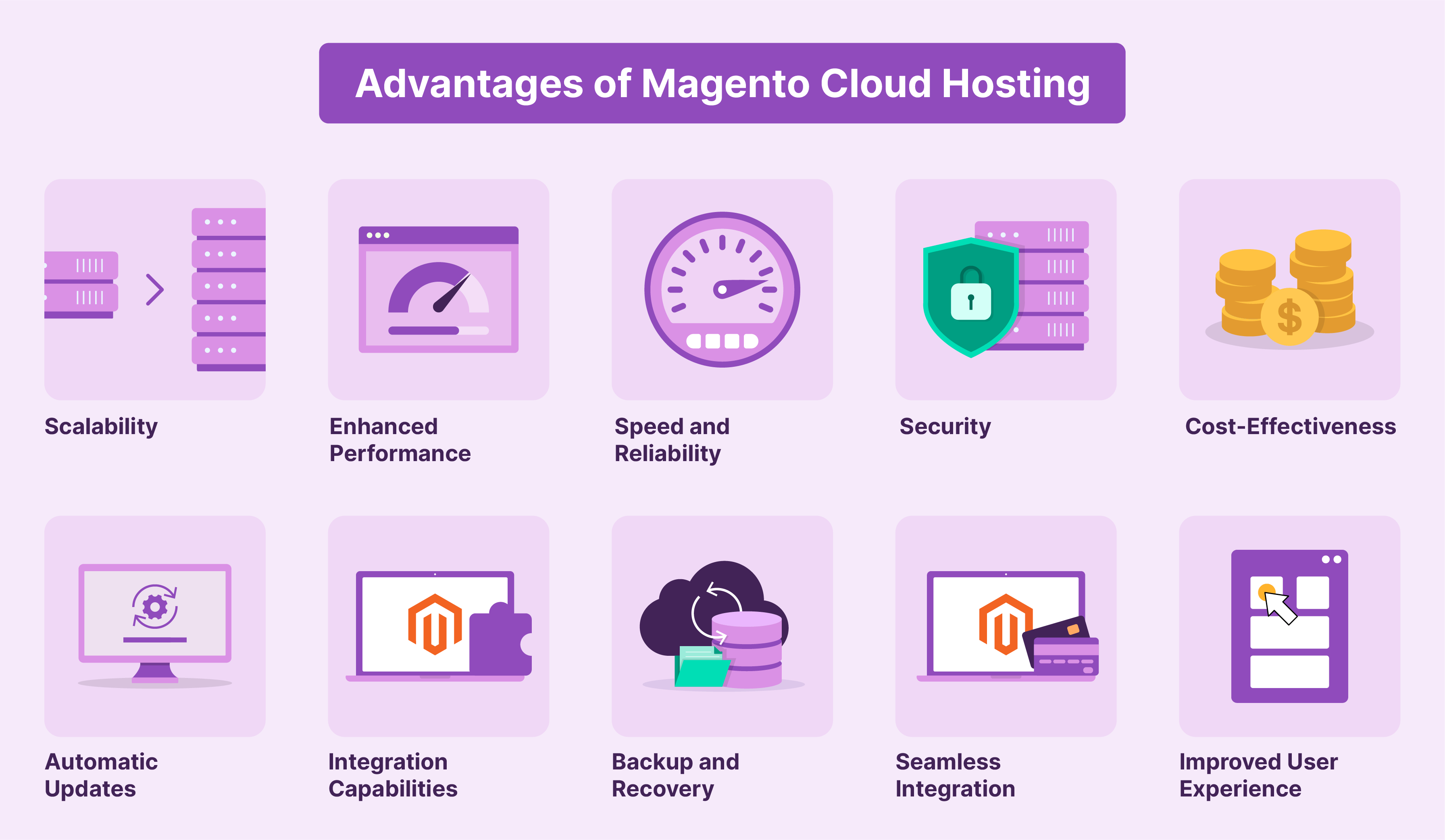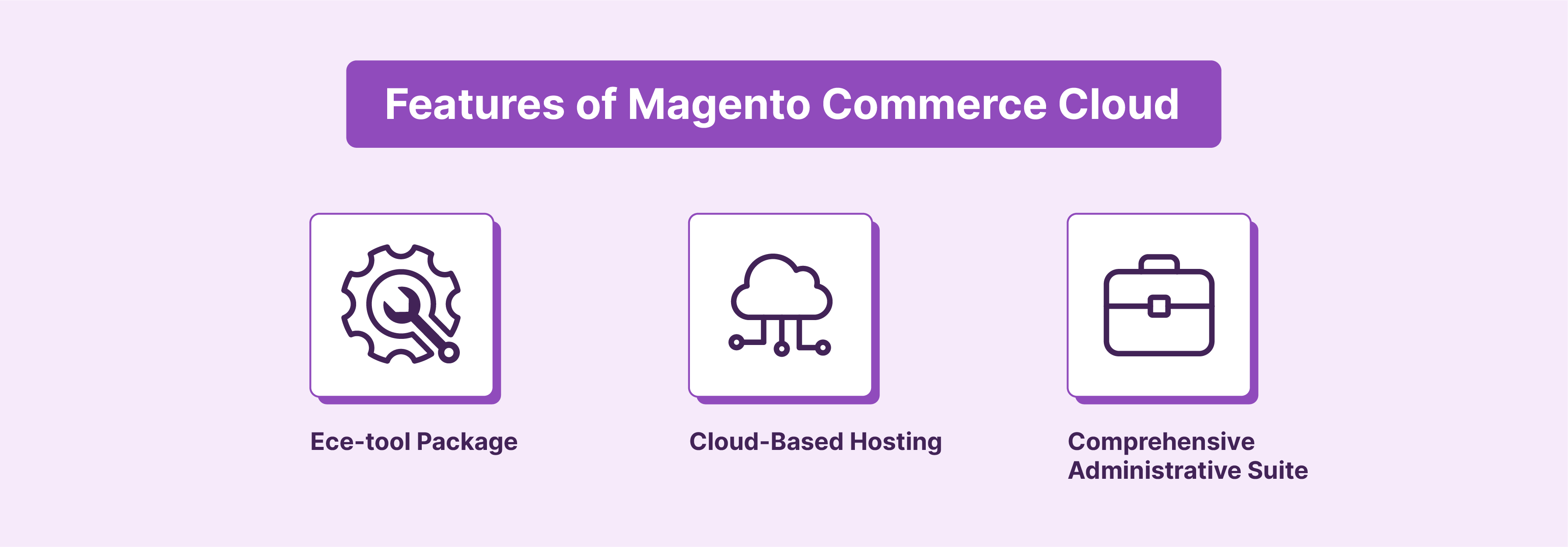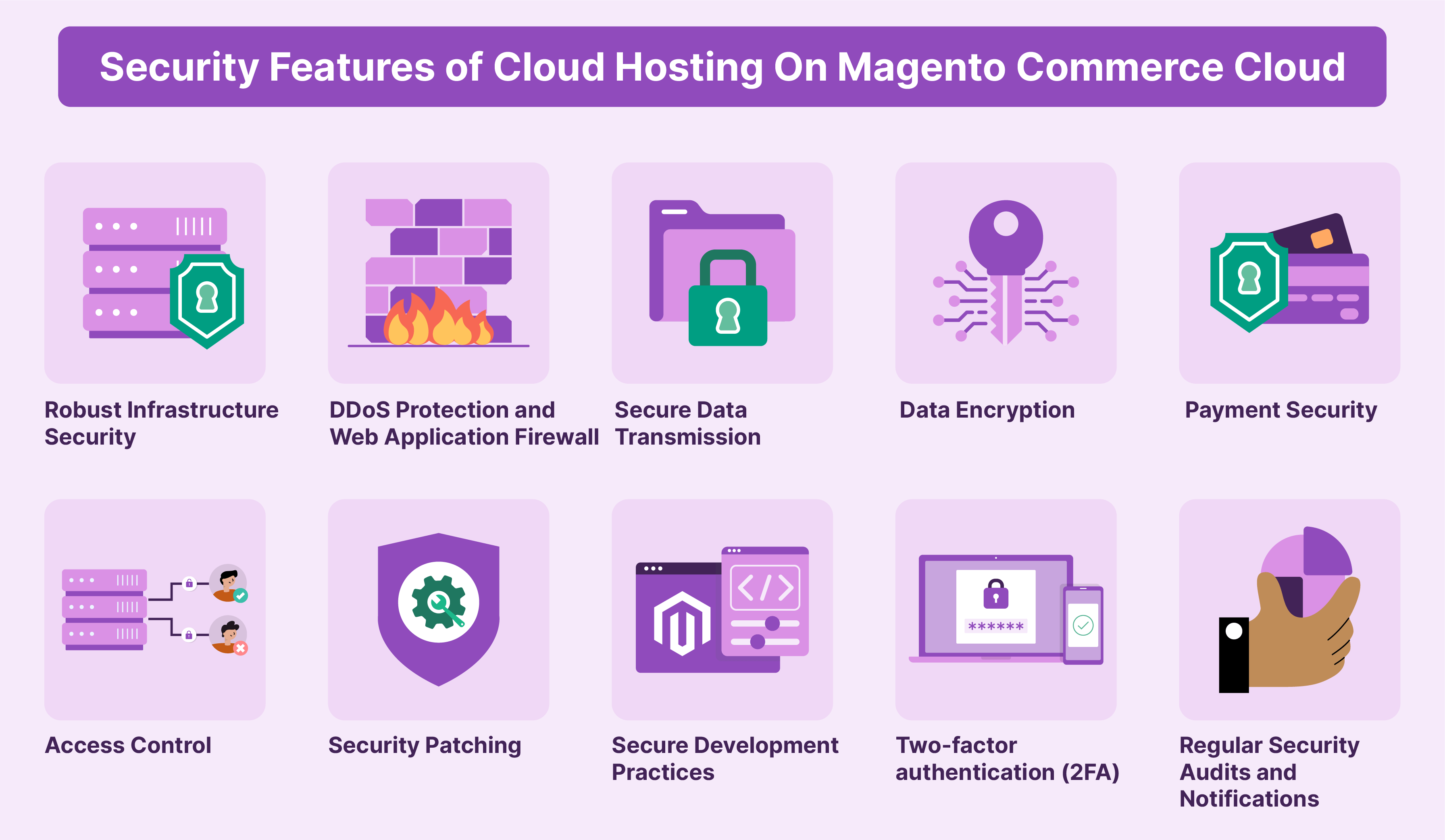
Magento Cloud Hosting: Magento Commerce Cloud Security Features
Magento Cloud Hosting refers to a specialized hosting solution for Magento stores using cloud-based servers. It utilizes cloud servers to provide reliable, scalable, and secure hosting for e-commerce businesses. This guide will discuss the features of Magento Cloud Hosting, including its essential security aspects.
Key Takeaways
-
Discover the scalability of Magento Cloud Hosting, allowing seamless adjustment of resources based on business growth or seasonal traffic fluctuations.
-
Explore enhanced Magento performance through Content Delivery Networks (CDNs) and advanced caching techniques for faster page loading and improved user experience.
-
Learn how security measures, including SSL support and encrypted data storage, ensure a safe ecommerce platform.
-
Explore the cost-effectiveness of Magento Cloud Hosting with a pay-as-you-go model.
-
Learn how Magento Commerce Cloud offers pre-provisioned infrastructure and a comprehensive administrative suite for effective Magento management.
What is Magento Cloud Hosting?

Magento Cloud Hosting is a hosting solution that uses virtual servers in a network. These servers distribute website content, making it more scalable with increased traffic. Cloud hosting provides three options: public, private, and hybrid.
Magento Cloud Hosting spreads website data across multiple virtual servers in the cloud. This redundancy ensures your website remains online even if one server encounters issues.
Advantages of Magento Cloud Hosting

1. Scalability
Magento cloud hosting offers exceptional scalability, allowing businesses to adjust resources. This flexibility proves especially valuable for businesses experiencing growth or facing seasonal fluctuations in website traffic.
2. Enhanced Performance
Magento Cloud Hosting significantly improves page loading times by harnessing Content Delivery Networks (CDNs) and advanced caching techniques. It results in a more satisfying user experience and enhances SEO rankings for Magento websites.
3. Speed and Reliability
The reliability of Magento Cloud Hosting is a key benefit. It achieves this by distributing website data across multiple servers. Even if one server encounters issues, your website remains operational, ensuring maximum uptime and minimizing disruptions. Your website loads faster with CDN and edge caching capabilities, providing a smoother user experience.
4. Security
Magento Cloud Hosting prioritizes security with features like Magento SSL support, encrypted data storage, and regular security updates. These measures provide robust protection against online threats, instilling confidence in the safety of your ecommerce platform.
5. Cost-Effectiveness
With its pay-as-you-go pricing model, Magento Cloud Hosting proves to be a cost-effective solution. You pay only for the resources you use, eliminating the need for significant upfront investments in hardware. This cost-efficiency can benefit businesses of various sizes.
6. Automatic Updates
The responsibility for updates and maintenance is handled by cloud providers, ensuring that your Magento Cloud Hosting environment always incorporates the latest features and security patches. It relieves you of the burden of managing these aspects yourself.
7. Integration Capabilities
Magento Cloud Hosting offers seamless integration with various platforms and third-party services. This capability streamlines your ecommerce operations, facilitating a more efficient and unified online business strategy.
8. Backup and Recovery
Most Magento Cloud Hosting providers offer automated Magento backup solutions and disaster recovery options. These features provide peace of mind in the unfortunate event of data loss, safeguarding your valuable ecommerce data and operations.
9. Seamless Integration
With Magento Cloud Hosting, you can seamlessly integrate various applications and services like payment gateways. It includes CRM and ERP systems in your online store, providing a more cohesive user experience.
10. Improved User Experience
Magento Cloud Hosting delivers faster loading times, increased website uptime, and seamless navigation. These enhancements collectively contribute to a superior user experience, boosting Magento conversion rates.
What is Adobe Commerce Cloud?

Adobe Commerce Cloud, also known as Magento Commerce Cloud, is Magento's own cloud solution. It operates as a managed hosting platform for Magento Commerce software, offered as a Platform as a Service (PaaS) by Adobe.
This solution offers a pre-provisioned infrastructure featuring technologies such as PHP, MySQL, RabbitMQ, Redis, and Elasticsearch, along with a development workflow based on Git.
Features of Magento Commerce Cloud

1. Ece-tool Package
Magento Commerce Cloud introduces the ece-tools package, which is designed to streamline various merchant tasks. This package simplifies processes like cron management and docker deployment, offering scripts and commands for automated eCommerce project deployment. It also facilitates database backups and environment configuration verification.
2. Cloud-Based Hosting
Magento 2 Cloud leverages cloud architecture, ensuring rapid scalability and consistent performance throughout the year. Hosted by a dedicated team of developers and operating on platforms like AWS (or Microsoft Azure for Pro projects), it efficiently handles the potential traffic spikes that can impact online retailers.
3. Comprehensive Administrative Suite
Magento Commerce Cloud boasts an extensive administrative suite from the Magento Commerce Edition, enhancing your ability to manage complex projects effectively. Key features include:
- B2B (business to business) Module
- Page Builder
- ElasticSearch
- Segmentation
- Content Staging
- Instant Purchase
- Visual Merchandiser
Security Features of Cloud Hosting On Magento Commerce Cloud

1. Robust Infrastructure Security
Magento Commerce Cloud relies on the secure infrastructure provided by Adobe, including data centers equipped with firewalls, intrusion detection systems, and physical security controls. This infrastructure safeguards your online store from unauthorized access and security breaches.
2. DDoS Protection and Web Application Firewall
Utilizing the Magento content delivery network (CDN) Fastly, Magento Commerce Cloud defends against distributed denial-of-service (DDoS) attacks. It rapidly blocks direct access to the parent server and redirects attackers. Fastly's web application firewall (WAF) protects against various threats, enhancing overall Magento security.
3. Secure Data Transmission
Magento Commerce Cloud supports HTTPS protocols for secure data transmission and encrypting critical data. It includes customer payment information during internet communication. It ensures protection against eavesdropping and unauthorized access to customer data.
4. Data Encryption
Data security is a top priority for Magento on cloud hosting, with encryption applied to all stored information, including customer and order data. This advanced encryption safeguards critical data even during a security breach.
5. Payment Security
Magento Commerce Cloud ensures secure payment transaction management through integration with reputable payment gateways. It adheres to industry-standard Magento security practices like PCI DSS to protect payment information.
6. Access Control
The platform offers access control mechanisms, allowing shop administrators to manage user roles and permissions efficiently. Assigning distinct access privileges based on roles prevents unauthorized access to sensitive data in your online store.
7. Security Patching
Magento regularly releases Magento security patches and updates to address vulnerabilities in Commerce Cloud. Implementing these fixes is essential to minimize security risks and protect customer data.
8. Secure Development Practices
Magento follows secure software development practices, including regular code reviews and security testing. It helps identify and address potential vulnerabilities throughout the development process. This approach ensures a strong and secure online business.
9. Two-factor authentication (2FA)
Magento Commerce Cloud enhances security through two-factor authentication. It requires users to provide an additional authentication method, such as a mobile device verification code and their login and password. It significantly reduces the risk of unauthorized access.
10. Regular Security Audits and Notifications
The platform undergoes routine Magento security audits to identify and rectify system flaws and vulnerabilities. Magento also provides timely security updates and notifications to inform customers of potential threats and offers guidance on mitigation.
Best Practices for Magento Cloud Security
1. Stay Updated with Magento Security
Regularly applying Magento security updates and patches is essential to protect your store from known vulnerabilities. Utilize the Magento Security Scan Tool to identify and promptly address any issues.
2. Implement Advanced Security Measures
Consider advanced security measures such as a Web Application Firewall (WAF) to add protection against web-based attacks. Explore options like the MGT WAF for Magento to enhance your store's security.
3. Choose a Secure Hosting Provider
Selecting a reliable hosting provider is critical for Magento cloud security. Magento hosting providers specialize in secure Magento hosting, offering your store a secure and protected environment.
4. Harness Innovative Technologies
Innovations like AWS Graviton2 servers by Amazon Web Services (AWS) can significantly improve cloud and Magento security. With enhanced processing speed and security features, AWS Graviton2 servers offer a reliable solution for your Magento store's security and efficiency.
FAQs
1. How does Magento Cloud Hosting differ from traditional hosting solutions?
Magento Cloud Hosting, unlike traditional hosting, operates on a cloud infrastructure, offering several advantages over traditional hosting services. It utilizes cloud computing to deploy resources based on demand, ensuring scalability and flexibility for Magento's ecommerce website.
2. What are the benefits of Magento Cloud Hosting?
Magento Cloud Hosting provides robust security measures, leveraging cloud services to safeguard an ecommerce website. Additionally, it follows a pay-for-the-resources model, optimizing cost-effectiveness while ensuring a reliable hosting service.
3. How does cloud infrastructure benefit Magento ecommerce?
Cloud infrastructure offers scalable resources tailored for Magento ecommerce. This architecture enhances performance, reliability, and security, ensuring a seamless and secure environment for online businesses.
4. How does Magento Cloud Hosting's payment model differ from traditional hosting services?
Unlike traditional hosting services that often involve fixed or predetermined costs, Magento Cloud Hosting follows a pay-as-you-go model. It means businesses utilizing Magento Cloud Hosting pay for the resources they use. This model offers more flexibility and cost efficiency for Magento ecommerce businesses.
Summary
Magento cloud hosting offers a web hosting solution using cloud servers tailored for Magento websites. It ensures scalability and security for ecommerce businesses. This guide covered the comprehensive features of Magento Cloud Hosting. These features included scalability, enhanced performance, security measures, cost-effectiveness, and seamless integration capabilities.
Explore Magento server hosting for a tailored and optimized solution for your ecommerce platform's hosting needs.


